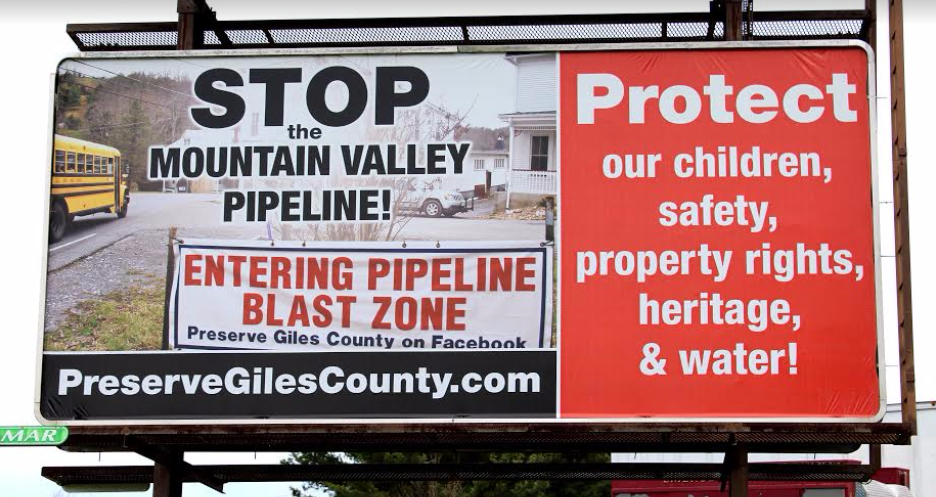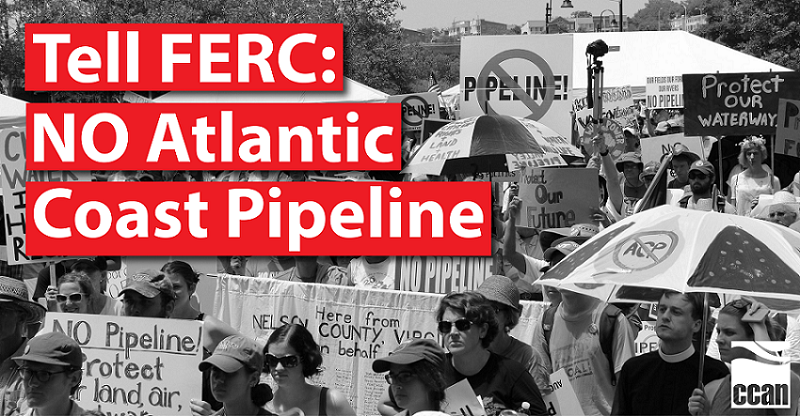Guest post by Rick Shingles, member of Preserve Giles County
—
On April 29, I plan to travel more than 500 miles to Washington D.C. for the Peoples’ Climate Mobilization. For me, marching is about more than politics, more than ideology.
For me, the issue is deeply personal.
The fossil fuel industry threatens my community in southwest Virginia. The proposed fracked-gas Mountain Valley Pipeline (MVP) is routed to bisect Newport which sits in the middle of the active Giles County seismic zone in the midst of the Appalachian fold belt. This 42-inch diameter pipeline would carve through steep ridges and karst valleys in some of the most pristine natural habitat and biodiversity in the world.
Our natural heritage, endangered species, aquifers (the primary source of our farm and residential water), safety from catastrophe like the 2010 San Bruno gas pipeline explosion, peace of mind, property values and property rights are all at risk.
Our town is just one casualty of a vast fracked-gas pipelines infrastructure either built or planned. There are 9,000 miles of new oil and gas pipelines proposed in the U.S. with 19 (including the MVP and the Atlantic Coast Pipeline) in Appalachia alone. And tens of thousands of homes and businesses are being sacrificed to supply the product these pipelines transport: fracked methane, an even more lethal greenhouse gas than carbon dioxide. Multiple perils accompany every stage of hydraulic fracturing: the toxic mix of chemicals used to induce it, the dispersal and storage of waste water which can poison drinkable water and soils, seismic activity, methane leaks at every stage of production and distribution, and the destruction of green economies.
A Roanoke Times editorial presents my county as a model for developing outdoor recreational economies. Yet our economy is imperiled by the MVP. The pipeline would cross tributaries of the New River (some multiple times). It would block access to Mountain Lake and the Cascades during the construction. And the Jefferson National Forest could become split by a 500-foot wide utility corridor.
All of this could upend fifteen years of collaboration by local businesses and county government to build a tourism economy that currently provides $26 million in annual business revenue, 16% of our sales tax, $90,000 in transient occupancy taxes and two percent of total tax revenue. That is a lot for a sparsely settled, rural county. We don’t want it trashed by an interstate pipeline ally.
Why should so many American communities be sacrifice zones to supply this fuel to other nations, a good number of which ban fracking?
That’s why I’m going to march in Washington.
I will support Americans in all communities that are being sacrificed to supply fracked gas.
And for what? For continued reliance on antiquated twentieth century energy sources that are increasingly unnecessary, less plentiful and more expensive than wind, solar, hydraulic, and tidal power?
I am going to fight for greater regulation of the Federal Energy Regulatory Commission that appears controlled by the very gas and oil industry it is supposed to regulate, approves any and all interstate pipeline applications, grants private companies eminent domain to take our land, and runs roughshod over state and local governments.
I am going for my children and grandchildren – to preserve a natural heritage threatened by our addiction to fossil fuels, to help stave off rising seas and coastal flooding and the fundamental alteration of inland climates that underlie many traditional industries (See Stephen Nash’s Virginia Climate Fever: How Global Warming will Transform Out Cities, Shorelines, and Forests). Climate disruption could well lead to unprecedented mass migrations and economic, social and political instability that could destabilize governments and exacerbate international conflicts.
The dire threats posed by climate disruption should not be partisan issues, red-states versus blue-states, or framed by ideologues of the left or the right.
I will journey to Washington understanding that each of us must look to ourselves first to protect our communities, preserve our natural heritage and safeguard our progeny. If we fail, I will not solely blame any particular individual or political party or politicians in general. Each citizen has the responsibility to reduce his or her own environmental footprint and to fulfill the obligation of democratic citizenship. We must act to hold our leaders accountable. We must take direct action.
I accept this responsibility.
One day, I hope to tell my grandchildren that I – with millions of others – met this singular challenge and became this nation’s greatest generation.
Rick Shingles is associate professor emeritus at Virginia Tech and coordinator of Preserve Giles County.


